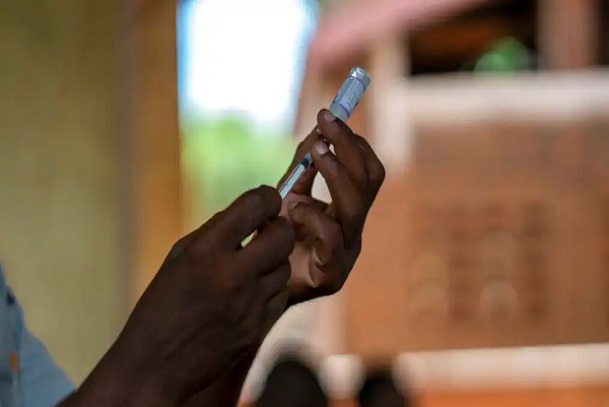 Wash your hands regularly and wear a face mask.
Learn more
Wash your hands regularly and wear a face mask.
Learn more

HEALTH NEWS !
Just like its West African country Ghana, Nigeria made history when it became the second country to approve the R21 malaria vaccine. This was after the National Agency for Food and Drug Administration and Control (NAFDAC) on Monday 17th April 2023 granted registration approval for the R21 Malaria Vaccine (Recombinant, Adjuvanted). This was disclosed by the Director-General of NAFDAC, Prof. Mojisola Adeyeye.
The vaccine was developed by the University of Oxford Scientists, and indicated for the prevention of severe malaria in children from five months to 3years old (36 months).
At the press briefing, Prof. Adeyeye said that Nigeria expects to get at least 100,000 doses of the vaccine in donations soon before the market authorization will start making other arrangements with the National Primary Health Care Development Agency.
In her statement, she said that the agency received the dossier of the R21 Malaria vaccine, manufactured by the Serum Institute of India Pvt Ltd (SSPL), and subjected it to independent review at two levels.
She said the dossier was reviewed by NAFDAC’s Vaccine Advisory Committee (NEVAC) independently using standards of the World Health Organization across relevant domains, in addition to the International Council for Harmonization of Technical Requirements for Pharmaceuticals for Human use guidelines, European Medicines Agency guidelines, scientific rigor on the vaccine and the context of malaria and specifically to Nigeria and best research and manufacturing governance.
“NEVAC members reviewed all sections independently using best review practices and met physically in plenary to assess and debate the reviews by sections, raised queries, and made recommendations accordingly.
“Overall, the assessment was scored as adequate -fully compliant with standards, and the report was submitted to the Director General.
“The review of NAFDAC’s Committee has always been guided by the same international standards and best practices with the same modality of an independent review by members followed by long hours of plenary where a rigorous assessment of each review took place. The Committee also independently scored the assessment as satisfactory and forwarded it to the Director General.”
“The R21 Malaria vaccine is an Adjuvanted protein vaccine presented as a sterile solution. A 0.5ml dose is composed of R21 Malaria antigen 5µg and Matrix-M1 50µg as an adjuvant filled in a vial as a ready-to-use liquid formulation for intramuscular injection. The Marketing Authorization Holders (MAHs) is Fidson Healthcare Ltd in line with the Agency’s Drug and Related Products Registration Regulation 2021.”
According to her, the R21 malaria vaccine dossier complied substantially with the best international standards with which the dossier was benched-marked.
She said the Joint Review Committee concluded that the data on the R21 Malaria vaccine were robust and met the criteria for efficacy, safety, and quality.
It was also adjudged that the vaccine’s known and potential benefits outweigh its known and potential risks, thereby supporting the manufacturer’s recommended use.
“The Joint Review Committee recognized the importance of an effective malaria vaccine (with 75 percent protection) as an additional interventional tool, as a critical need in Nigeria with the highest malaria burden.
“The Joint Review Committee also the agency communicated the need for expansion of the clinical trial conducted to include a phase 4 clinical trial/Pharmacovigilance study to be carried out, given the peculiarity and heterogeneous nature of malaria in Nigeria.
“The Joint Review Committee was also interested in reviewing data of the human-malaria parasite dynamics of the 25 percent not covered to understand issues bothering on non-protection that could inform further research.
“A provisional approval of the R21 Malaria Vaccine was recommended and this shall be done in line with the WHO’s Malaria Vaccine Implementation Guideline,” she noted.
She said, “The brief on the approval of the R21 Malaria vaccine has been communicated to the Minister of Health and National Primary Health Care Development Agency for appropriate actions toward immunization in the respective population.”
According to the latest WHO World Malaria Report 2022, there were an estimated 619 000 malaria deaths globally in 2021 compared to 625 000 in the first year of the pandemic. In 2019, before the pandemic struck, the number of deaths stood at 568 000. Malaria cases continued to rise between 2020 and 2021 but at a slower rate than in the period 2019 to 2020. The global tally of malaria cases reached 247 million in 2021 compared to 245 million in 2020 and 232 million in 2019.
NOTE: Important Information on the Vaccine
Malaria is usually severe in children below 3 years and often leads to death. The malaria vaccine will reduce the severity of malaria in children vaccinated thereby avoiding death from malaria. The vaccine is not necessary and will not be used by adults. Adults already have antibodies to malaria.